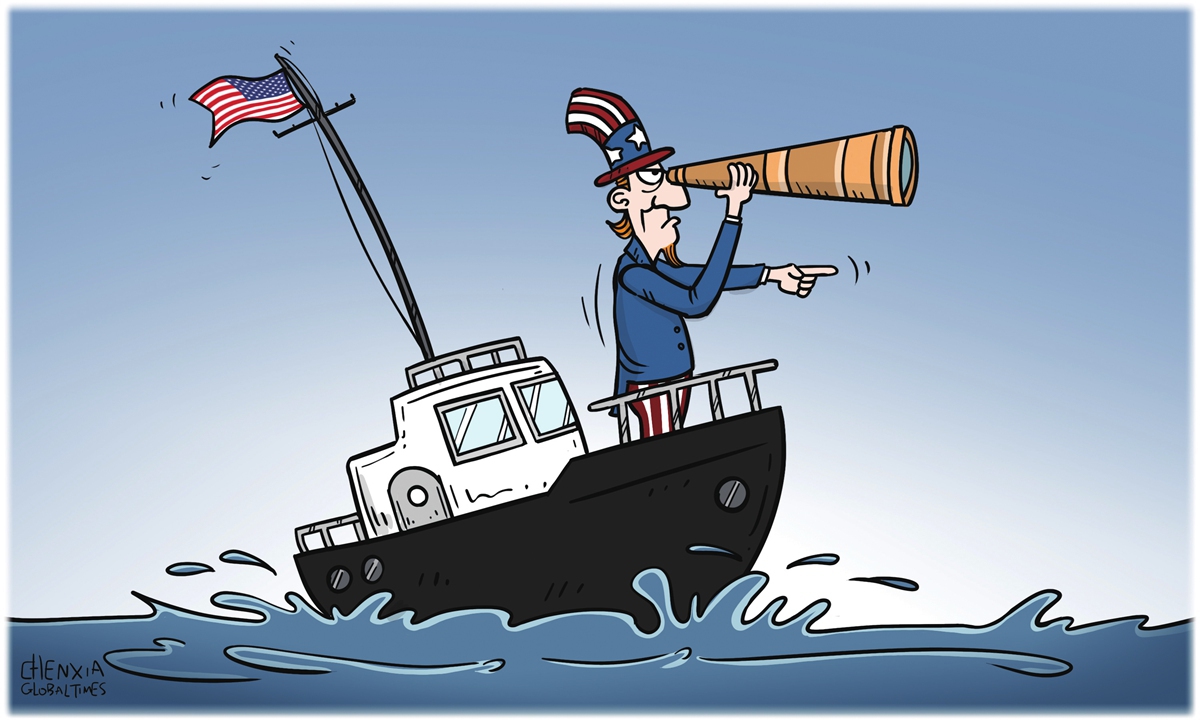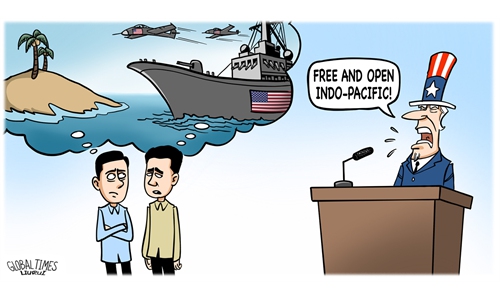
US Asia-Pacific Illustration: Chen Xia/GT
In rather alarming wording, Assistant Secretary of Defence for Indo-Pacific Security Affairs Ely Ratner warned at a think tank's annual conference in Washington on Tuesday of the "unsafe and unprofessional behavior" of the Chinese military in the South China Sea, and said that "it is only a matter of time before there is a major incident or accident in the region."
It is worth noting that this year marks the 20th anniversary of the signing of the Declaration on the Conduct of Parties in the South China Sea. In the past 20 years, despite the interference of the US as an external power, the South China Sea has been in a relatively peaceful state, and the ability and will of China and South China Sea claimant countries to control and manage disputes are growing. China and ASEAN countries are also firmly pushing forward the negotiations on the Code of Conduct for the South China Sea.
The "matter of time" bombast from Ratner is just another hype of the so-called China threat theory that would give the US an excuse to intervene in the Asia-Pacific region, including the South China Sea, and advance its Indo-Pacific Strategy. At the same time, it could drive a wedge between China and regional countries so that the US could promote a regional alliance aimed at China.
The US wants to label China as "regional destabilizer" by accusing China of "unsafe and unprofessional behavior." But it is the US that has been making waves in the region. The US often resorts to the "rules-based order" to point a finger at China, but what the US is really worried about is not the so-called rules, but the challenges China poses to the US leadership in making and implementing such rules.
Song Zhongping, a Chinese military expert and TV commentator, believes that the major incident referred to by Ratner means a military clash with the US provoked by China. But Song said clashes won't occur if the US does not take the initiative to provoke.
"The so-called major incident is exactly a US-made conflict. While Ratner claimed 'a major incident or accident in the region' triggered by China is a matter of time, it exactly shows that it is the US that may send shockwaves in the South China Sea sooner or later."
On Tuesday night, the Ronald Reagan carrier strike group entered the South China Sea again. Song believes that if the US carrier strike group attacks relevant islands in the South China Sea or clashes with Chinese warships and fighter jets, this may equal to creating a conflict.
Prior to the US presidential elections in 2020, there were media reports saying that the Trump administration could take the risk of attacking China's islands in the South China Sea with MQ-9 Reaper drones to aid his re-election.
"Those were dangerous provocations. If the US really does so, a military clash is bound to occur between China and the US in the South China Sea and beyond," Song noted.
Peace and stability in the South China Sea makes the US exasperated, while a tense region serves US interests. If the US makes a provocation, a major political incident or a military clash cannot be excluded. Once turbulence occurs in the South China Sea, regional countries including China would bear the consequences, regional economy would lose momentum, and the US would reap the strategic benefits.
Regional countries have gradually realized that it is the US that makes Asia risk slipping into a security dilemma from a model of peace and development. The US is the provocateur of South China Sea tensions, while China is the main defender of peace. Therefore, despite divergences and disputes, regional countries have enhanced their ability to manage divergences and disputes, and the situation in the waters shows a steady trend.
In his speech, Ratner asserted that China's behavior implicates "not only US forces but allied forces operating in the region." Obviously, the US wants to drag its allies into the mud. Song believes that it is difficult for the US to form any cliques in the South China Sea region, and the US is not capable of confronting China alone, in other words, the US is not prepared for a conflict with China.
Zhang Tengjun, deputy director of the Department for Asia-Pacific Studies at the China Institute of International Studies, told the Global Times that when Ratner worked for the Center for a New American Security, he had shown a tough China stance when communicating with Chinese scholars.
"The think tank holds many activities regarding the South China Sea and Asia-Pacific affairs. As a middle-aged China hardliner and different from the old-generation China hands, Ratner has limited knowledge but deep-rooted convictions about China. He stresses maintaining US advantages and competing with China in all aspects. When people like him enter the Pentagon, they are bound to bring about a tougher stance toward China," said Zhang.


